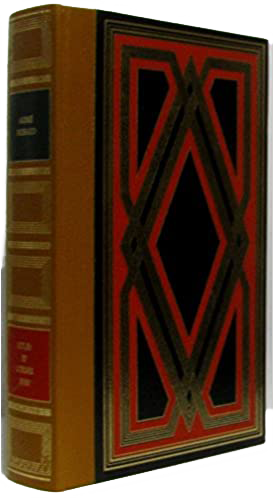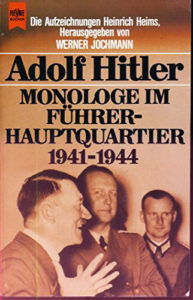 (Left, André Brissaud’s Hitler et l’Ordre Noir.) It is probably unnecessary to point out that the ‘transparency’ referred to here is not material, and therefore not visible. It represents a state of being more subtle than the one we know; more open to direct contact with the intangible and even the informal. In other words, the Hyperboreans, holders of the primordial Tradition, would have been capable of intellectual intuition to a degree that we cannot conceive.
(Left, André Brissaud’s Hitler et l’Ordre Noir.) It is probably unnecessary to point out that the ‘transparency’ referred to here is not material, and therefore not visible. It represents a state of being more subtle than the one we know; more open to direct contact with the intangible and even the informal. In other words, the Hyperboreans, holders of the primordial Tradition, would have been capable of intellectual intuition to a degree that we cannot conceive.
Who were they? And, if they really existed, where did their territory extend? The more or less evocative allusions made to them by the ancients—by Seneca in his Medea; by Pliny the Elder, Virgil, Diodorus of Sicily, Herodotus, Homer (in the Odyssey) and the author or authors of Genesis, and especially of the enigmatic Book of Enoch—are rather vague, though all referring to the ‘Great North’.
And the evocation of the extreme ‘whiteness’ of the Hyperboreans, of the unspeakable beauty of their women and the ‘extraordinary gifts of perspicacity’[1] of some of them, would make one think of an Aryan race immensely superior to the average of the present-day Norsemen, which is not surprising since it concerns a past that is lost in the mists of time.
But there is more: the scholar Bal Gangadhar Tilak, better known as Lokomanya Tilak, a Hindu scholar and sage,[2] has, in his book The Arctic Home in the Vedas, very clearly linked the oldest tradition of India to a region located in the high latitudes; a region knowing both the long polar night and the midnight sun, and the aurora borealis: a region where the stars neither rise nor set, but move, or seem to move, circularly along the horizon.
The Rig Veda, which he studied especially, and from which he draws most of the quotations in support of his thesis, is said to have been, as well as the whole of the Vedas—or ‘seen’, i.e. direct, knowledge—revealed to these ‘Aryas’, i.e. ‘Lords’ of the extreme Septentrion, and preciously preserved by them during the migrations which, in the centuries, gradually brought them into India.
Tilak places the abandonment of the Arctic homeland at the moment when it lost its temperate climate and verdant vegetation to become ‘icy’, that is to say, at the moment when the Earth’s axis tilted by more than twenty-three degrees, some eight thousand years ago. He doesn’t specify whether the island or the portion of the continent thus struck by sudden sterility was swallowed up, as the Thule legend has it, or continues to exist somewhere in the vicinity or within the Arctic Circle. Nor does he mention the steps which the repositories of the Eternal Veda—the Wisdom hidden beneath the sacred texts of that name—had to take between their Arctic homeland and the first settlements they founded in north-west India.
And as his work is not addressed to initiates (who wouldn’t need it, but only to bona fide orientalist scholars whom he knows to be insensitive to any argument not supported by evidence) he says nothing about the ‘underground’ initiatory centres, Agartha and Shamballa, which are so often mentioned in the secret teaching of the Thule Society to its members—teaching which Alfred Rosenberg, Rudolf Hess, Dietrich Eckart and, presumably through the latter, Adolf Hitler himself received.
Agartha, or Agarthi, would be the centre placed ‘under the wheel of the Golden Sun’, that is to say, the one to which the contemplatives who refuse in advance to participate in the affairs of this world are attached: that of the sages whom I have called ‘men above Time’. Shamballa, on the other hand, would be the spiritual centre of men ‘against Time’: initiates who, while living in the eternal, accept to act in this world ‘in the interest of the Universe’, according to the unchanging values, or, to use the Führer’s own words, according to the ‘original meaning of things’. It is, of course, to this second centre of the Masters of Action that Adolf Hitler would relate.
Remarkably, the names of Agartha and Shamballa ‘appeared several times on the lips of more than one SS leader during the Nuremberg trials, and more particularly, of the SS leaders of the Ahnenerbe’.[3]
This organisation, among others, sent to Tibet ‘an expedition led by the SS ethnologist Standartenführer Dr Scheffer’.[4] The fragments of his reports, which exist on microfilms in the National Archives in Washington, seemed ‘extraordinary’ to André Brissaud, who read them. Why such an expedition? Certainly not to try to find, in Central Asia, ‘the origins of the Nordic race’, as Brissaud seems to think.
During the Third Reich, even schoolchildren knew from their textbooks—some of which, such as that of Klagges and Blume, So ward das Reich, were remarkable—that this race had spread from north to south and east, and not vice versa.[5] What Dr Scheffer and his collaborators wanted, no doubt, was rather to try to penetrate the mystery of Agartha and Shamballa; perhaps to try, with the help of the heads of a spiritual centre where it manifests itself, to get in touch with the principle (for it is a principle, not a personage) that René Guénon calls the ‘king of the world’.[6]
This seems all the more plausible since, among these sections of the Ahnenerbe whose work was classified as a ‘secret affair of the Reich’ and ‘of which nothing is known’, ‘one section included, in addition to the study of ancient languages, cosmology and archaeology, the study of Yoga and Zen’; and another was focused in ‘esoteric doctrines, and magical influences on human behaviour’.[7]
__________
[1] Brissaud: Hitler et l’Ordre Noir, page 58.
[2] Born 3 July 1856; died 1 August 1920. He was a Brahmin from Maharashtra, of the Chitpavan sub-caste.
[3] Brissaud: Hitler et l’Ordre Noir, page 59-60.
[4] Ibid.
[5] Klagges & Blume, So ward das Reich, page 15.
[6] René Guénon: Le Roi du Monde, page 13.
[7] Brissaud: Hitler et l’Ordre Noir, page 285.
